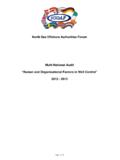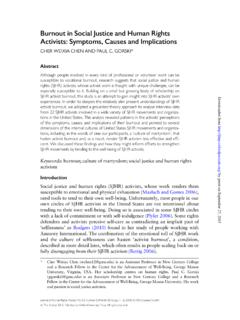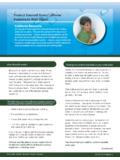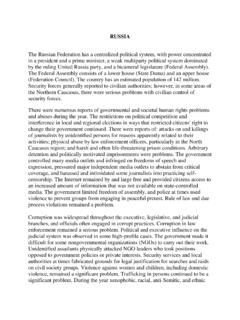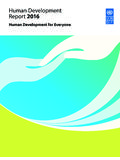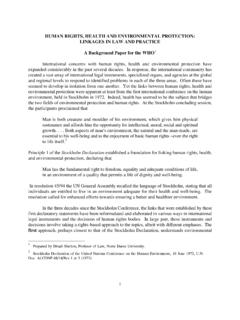Transcription of THE HUMAN DEVELOPMENT INDEX AS AN …
1 The 3rd OECD World Forum on Statistics, Knowledge and Policy Charting Progress, Building Visions, Improving Life Busan, Korea - 27-30 October 2009 THE HUMAN DEVELOPMENT INDEX AS AN EFFORT TO MEASURE well -BEING IN HONDURAS GLENDA GALLARDO UNDP HONDURAS. CHIEF ECONOMIST Introduction1 As a society we are always interested in knowing where we are and where we are headed. No one could deny that information and measurement are essential tools to this purpose and without them it becomes difficult to perform an assessment how much progress the society has made. The discussion rather centres on what to measure and how to measure it, also, how much advancement it will be considered a real progress.
2 Generally we talk about measuring DEVELOPMENT , so we choose a series of indicators in different social fields, mainly economics, to describe how a particular society has progressed over the time. There are other phrases that have become important in the public debate trying to explain what DEVELOPMENT really means to a society. Among these we have: well -being , Societal Progress , Quality of Life , HUMAN DEVELOPMENT , etc. Each particular society has its own consideration about the real meaning of DEVELOPMENT . This is one of the reasons why a need has emerged to develop a more comprehensive view of DEVELOPMENT and progress, considering social, environmental and economic concerns, rather than just rely on economic indicators2. The Istanbul Declaration3 represents the existing consensus amid all those who share a common interest in promoting this debate, who participated in the Second World Forum on Statistics, Knowledge and Policy.
3 Among these are presidents, ministers, senior statisticians, civil society leaders and leading 1 Acknowledgments to Jos V lez, Statistician of the Prospective and Strategic Unit of UNDP, for his valuable contributions. 2 Economic and Social Commission for Asia and the Pacific, Measuring the progress of societies: What is the relevance for Asia and the Pacific? , Note by the Secretariat, E/ESCAP/CST/8*, 2008, p. 3 3 OECD. Istanbul Declaration , From Page 2 of 13 academics, among other. It was signed in June 2007 by the European Commission, the Organization for Economic Cooperation and DEVELOPMENT , the Organization of the Islamic Conference, the United Nations, the United Nations DEVELOPMENT Program and the World Bank.
4 In the Declaration, all its signatories affirm their commitment to measuring and fostering the progress of societies in all their dimensions and to supporting initiatives at the country level. In order to take further actions they call to: Encourage communities to consider for themselves what progress means in the 21st century; Share best practices on the measurement of societal progress and increase the awareness of the need to do so using sound and reliable methodologies; Stimulate international debate, based on solid statistical data and indicators, on both global issues of societal progress and comparisons of such progress; Produce a broader, shared, public understanding of changing conditions, while highlighting areas of significant change or inadequate knowledge.
5 Advocate appropriate investment in building statistical capacity, especially in developing countries, to improve the availability of data and indicators needed to guide DEVELOPMENT programs and report on progress toward international goals, such as the Millennium DEVELOPMENT Goals. One of the key issues involved within all these stated actions is the need of citizen participation and active involvement in building a renew framework for evaluating the quality of life in the society they live in. As Giovannini pointed out, people today expect to be in control of their own evaluations and life choices .. Progress must increasingly be measured against criteria more closely aligned with public aspirations and notions of what a better life means 4.
6 The present document briefly discusses how the HUMAN DEVELOPMENT INDEX has been proposed as a better way to measure well -being than traditional GDP per capita and how this INDEX has played an important role in evaluating DEVELOPMENT in Honduras. After this, we proceed to describe briefly, the condition of the National Statistics System, highlighting some of the initiatives that have been carried out to bring about participation among stakeholders in Honduran society. 4 Giovannini, E, Why measuring progress matters , OECD Observer, From Page 3 of 13 1. HUMAN DEVELOPMENT INDEX : An effort for measuring well -being Since the first HUMAN DEVELOPMENT Report was published in 1990, HUMAN DEVELOPMENT was defined as a process of enlarging people s choices and enhancing their capabilities.
7 The process concerns the creation of an enabling environment in which people can develop their full potential and live productive and creative lives according with their needs, interests and own values. In this sense, HUMAN DEVELOPMENT paradigm promotes well -being in a society. Even though HUMAN DEVELOPMENT is a broad concept with infinite dimensions, it is said that at all levels of DEVELOPMENT , there are three basic ones: a long and healthy life, access to knowledge, and a decent standard of living. Without these basic dimensions, other dimensions such as political freedom, the ability to participate in one s community, self respect and so on will often remain inaccessible. Measuring HUMAN DEVELOPMENT is not an easy task, since this concept has many facets.
8 This suggests that any INDEX of HUMAN progress should incorporate a range of indicators to capture this complexity. But the problem is that not all countries in the world have relevant and comparable statistical information to do this. In addition, it is thought that too many indicators could produce a confusing picture, perhaps distracting policymakers from the main overall trends. For the previous reason, a composite measure called HUMAN DEVELOPMENT INDEX (HDI) was introduced to measure HUMAN DEVELOPMENT . This INDEX focuses in the three basic dimensions mentioned above using four basic indicators: (1) life expectancy at birth, as a proxy measure of a population s health and longevity; (2) adult literacy rate and combined gross enrolment ratio, as measure of knowledge and education; Finally, (3) GDP per capita at purchasing power parity (PPP) as measure of a decent standard of living.
9 Up to the point when HDI was introduced, the dominant view of DEVELOPMENT presumed that the level and growth of income sufficed as the criterion for HUMAN well -being. However, it has been demonstrated with evidence presented in global, regional and local reports on HUMAN DEVELOPMENT , there is no automatic link between economic growth and HUMAN progress. Although economic growth is necessary to make progress in well -being, it is far from sufficient as the sole condition. HDI was then one of the first indicators to challenge the supremacy of GDP and has become widely referenced and used. The basic use of HDI is to rank countries, regions or territories by level of HUMAN DEVELOPMENT : low, medium and high. Regarding citizen participation in the process of measuring HUMAN DEVELOPMENT progress, it is worthwhile mentioning that in occasion of twentieth anniversary of the HUMAN DEVELOPMENT Report in 2010, the HUMAN DEVELOPMENT Report Office intends to review the contributions of the HUMAN DEVELOPMENT Report globally to conceptualizations of DEVELOPMENT , as well as its impacts on DEVELOPMENT in practice.
10 Page 4 of 13 It will also become a major opportunity for in-depth consideration of some key challenges facing HUMAN DEVELOPMENT measurement, for instance, how to consider other aspects of DEVELOPMENT , such as freedom of choice or opportunity, or how to consider the disparities that characterize DEVELOPMENT in a better way, among others. This topic is discussed in the Statistical Update of HUMAN DEVELOPMENT Indices, published in 2008 by the HUMAN DEVELOPMENT Report Office (HDRO). The Report also establishes that in the upcoming months, a series of regional and country level consultations will be conducted with leading DEVELOPMENT thinkers and practitioners, inside and outside of governments. Although it is still in a limited fashion, this represents the promotion of community participation by the HDRO.











